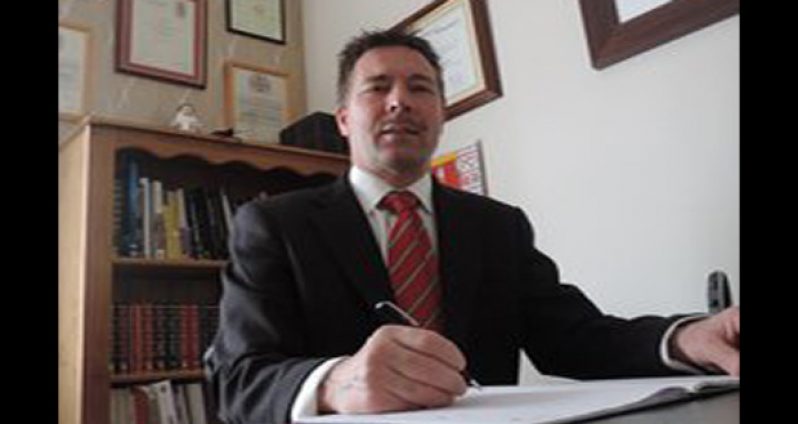…expert calls for new financial crimes act
By Ariana Gordon
IRISH Financial expert Dr. Sam Sittlington has called for the APNU+AFC coalition government to consider repealing the Anti-money laundering and Countering the Financing of Terrorism legislation (AML/CFT) and replacing it with the Proceeds of Crime Act (POCA).During a presentation yesterday at the residence of British High Commissioner Greg Quinn on his findings pertaining to the operations of the Special Organised Crime Unit (SOCU) over the past five weeks, Dr. Sittlington said the legislation should be replaced with POCA, based upon a regional model.
“This model legislation is currently being pushed as the “gold standard” in the Region. It is closely based upon the UK POCA, and this is for a very good reason,” Sittlington said, adding:
“If [the] local POCA is essentially the same as UK POCA, then UK case law can be used to support money-laundering prosecutions, and the use of asset-recovery powers. However, if there are differences in the wording of the legislation, then UK case law is useless.”
PASSAGE
The AML/CTF legislation was passed in the National Assembly in June 2015, despite strong objections from the opposition People’s Progressive Party Civic (PPP/C). The passage of the Bill paved the way for all financial transactions here to be monitored. But Dr. Sittlington is saying that it is a legal opinion that once the legislation introduces a requirement to narrowly define crime from which the “proceeds” derived, then the case of R v Anwoir [2008] EWCA Crim 1354 cannot be applied.
The case at reference spoke to “unexplained wealth” and the Court of Appeal found that there are two ways in which the Crown could have proven the property is criminal property, and that is by (a) “showing that it derives from conduct of a particular kind or kinds and that conduct of that kind or those kinds is unlawful; or (b) by evidence of the circumstances in which the property is handled, which is such as to give rise to the irresistible inference that it can only be derived from crime.”
PROCEEDS OF CRIME
Sittlington said the definition of “proceeds of crime” in the United Kingdom means the proceeds of any offence as was highlighted in the case of R V Anwoir. However, in Guyana’s case and other jurisdictions, “proceeds” must be of a specific type of crime.
“In Guyana,” he said, “that means an office listed in the Schedule, or which carries a penalty of six months or more on first conviction.
“This change would facilitate the use of circumstantial evidence in cases where the original crime is unknown.”
But despite the recommendation from the expert and his justification for same, he is advising that Guyana keeps its definition of “currency.”
“I think it is the widest definition I have seen, and it would encompass ‘prepaid’ credit cards as well as gold, precious stones and jewellery,” Dr Sittlington said, adding that based on that definition, the country’s “cash seizure” powers are more powerful than even those of the the United Kingdom, which are deemed the best in Europe. He also noted that the loss of gold, diamonds and other precious minerals is a huge issue for the local economy.
POCA is used by several Caribbean territories in their fight against money laundering and the countering of financial terrorism.
SPECIAL PROSECUTORS
Meanwhile, Dr. Sittlington recommends that special prosecutors be allocated to deal with POCA-related crimes.
Said he: “I believe the DPP should allocate a number of special prosecutors to concentrate solely on Proceeds of Crime matters. Expertise to prosecute money laundering-type cases is required, and shouldn’t be an ad-hoc presentation to prosecutors who are dealing with multiple crime cases, and maybe seeing money-laundering cases for the first time.”
The expert noted that as the number of Special Organised Crime Unit (SOCU) cases increase, the requirement for special prosecutors will be greater.
“Perhaps planning for this now will reap early benefits as opposed to when it is too late,” Dr. Sittlington said, adding: “The positives from this move will give SOCU investigators confidence to ask for prosecutorial advice, add value to their prosecution files in terms of solid evidence and increase the number of successful prosecutions and confiscations.”
ASSET-RECOVERY POWERS
Additionally, Dr. Sittlington said while forfeiture should never be a substitute for criminal prosecution, non-conviction-based asset recovery provides for the recovery of cash under proceeds of crime, where a conviction is not required. “It is a civil process that refers to the cash seized or instrumentalities that relate to crime or intended for the use in crime. Non-conviction-based civil forfeiture differs from criminal forfeiture in that the latter requires a criminal trial based on “beyond a reasonable doubt” standard and prosecution prior to the actual confiscation proceedings taking place.”
However, he said that in non-conviction-based proceedings, the State must establish the “unlawful conduct” or a “balance of probabilities” standard of proof. “Such an addition to the current AML/CTF legislation would have a dramatic effect on deterring criminal activity and recovery of assets (stolen from the state or otherwise) where law enforcement cannot put a crime to the assets/funds,” said Dr. Sittlington, who noted that he is cognisant of the fact that the State Assets Recovery Unit (SARU) is currently pursuing a similar programme. “I want to add my support to that initiative,” he stated.












